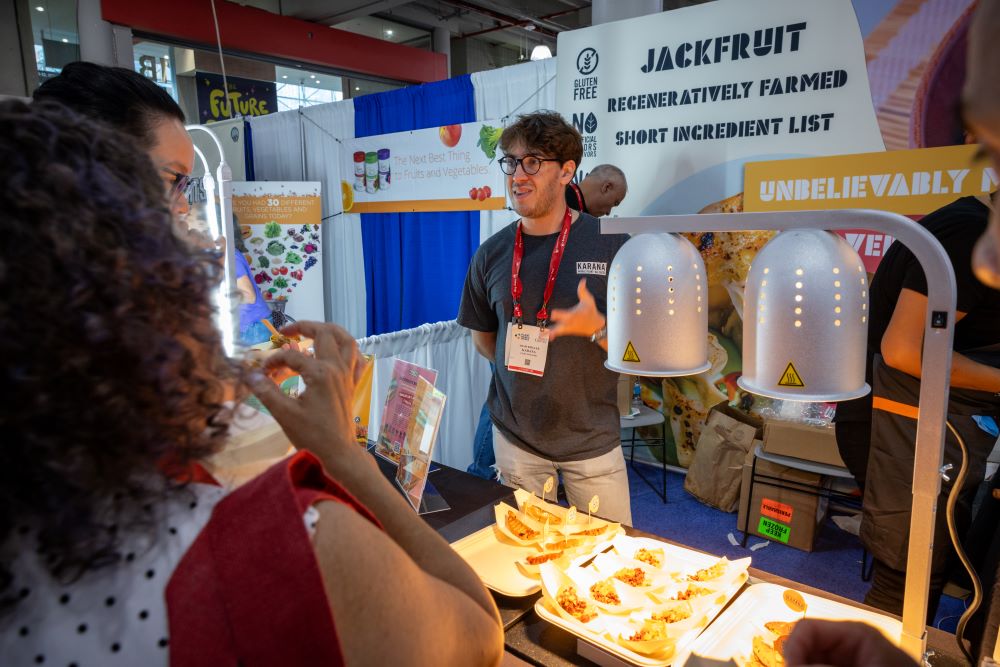Attendees at this year’s Plant Based World Expo in New York City last week encountered innovative new products like jackfruit dumplings, bacon made from mushrooms and vegan crab cakes, a big change from the burgers and nuggets that filled so many booths in years past.
The tagline for this year’s event was “The Next Wave,” a reflection of the changes in the plant-based food industry since the boom years that kicked off in 2019 with Beyond Meat’s $240 million IPO.
The sudden surge in popularity of plant-based burgers from Beyond and Impossible Foods spawned a slew of competing products from startups and big food companies alike, many of which were well-funded and rushed to market quickly to make the most of the growing buzz around the category.
Suddenly, new brands of plant-based burgers, nuggets and cheeses were hitting the market at a rapid clip, and the result of all the fast growth eventually became an image problem for the industry, No Evil Foods co-founder Sadrah Schadel said during a panel.
“It attracted many brands that shouldn’t have been here yet,” Schadel said. “It’s frustrating for the brands that are really experience focused” because consumers who aren’t vegans or vegetarians often don’t distinguish between brands. A bad experience with one brand can turn them off to the entire category.
The level of funding pouring into plant-based startups during the boom years was unsustainable and, more recently, media coverage has raised questions about how much consumer demand there is for plant-based alternatives and how much room there is for the category to grow.
All that said, brands at the show were optimistic about the potential for future growth in the industry and focused on continually improving their products and working together to support and grow the plant-based food segment as a whole with a deeper understanding of what consumers really want.
The consumer attraction challenge
Eighty-four percent of consumers surveyed for FMI-the Food Industry Association reported at least trying a plant-based food or beverage alternative, and 44% said they’re regular purchasers. Curiosity and nutrition concerns top the list of reasons consumers are tempted to try plant-based products, while taste and health are cited as the top reasons for continuing to buy those products.
FMI’s Steve Markenson presented the findings, which included retail sales data from Nielsen IQ and comments from consumers who were interviewed about their experiences and feelings about plant-based meat, dairy and seafood alternatives.
The interviewees came from different age groups, life stages and parts of the country, but their comments had some similarities. All seemed to agree that above all else, plant-based foods have to taste good. That said, at least one stressed that tasting good didn’t necessarily mean replicating a traditional animal-based food.
Many of the sessions during the show focused on the future and the need for more attention to consumers – in understanding what they want, educating them on the benefits of plant-based foods and continuing to innovate to provide the best possible experience.
And often that might mean slowing down and not rushing to market with a product that has the potential to sour consumers on plant-based eating, industry experts and executives said.
A cheesy dilemma
Perhaps one of the categories where the trend has been most evident is plant-based cheese, a category that has come a long way in recent years.
Good Planet Foods began with a mission to make sustainable plant-based cheeses that were tasty enough to bring consumers back for more.
“For a long time there were one or two of us, then there was an explosion in 2020 and 2021 and suddenly there were 20 or 30 [brands,]” Good Planet CEO David Israel said during a panel.
“A lot of them just wanted the sales, they didn’t care about the consumer experience.”
The problem with that was that once a consumer had a bad experience with one plant-based cheese brand, it was likely to turn them off to all vegan cheeses, he said.
Good Planet’s focus has been on continually innovating and improving its products, Israel said, with an eye on upping the nutritional value as well as the taste and texture of the products, expanding beyond slices and shreds with snack packs, snackable wedges and wheels of smoked gouda and cheddar.
Maybe don’t call it meat
FMI’s data showed that 90% of the people who buy plant-based meat alternatives also buy traditional meat. That can lead consumers to compare the two, bringing home the fact that plant-based products can be close to the original but not exactly the same. When people become vegetarian or vegan, their taste buds change over time. For flexitarians and other omnivores, expecting plant-based alternatives to have the exact taste and mouthfeel of the animal-based products isn’t realistic.
In addition to improving the plant-based food experience for consumers, brands and the industry as a whole likely need to manage their customers’ expectations. A plant-based burger can taste delicious, but it’s made from plants and never will taste exactly like a beef burger – and it shouldn’t be sold that way,
During the boom years, brands were telling consumers their plant-based products were meat and cheese, “but we forgot to tell them it wasn’t,” Good Planet’s Israel said. “We didn’t let consumers know what to anticipate.”
The answer, many speakers said, is to educate the public about the benefits of plant-based eating while providing products so tasty that they stand alone and aren’t expected to exactly mimic or substitute for anything else.
“There’s a lot of self reflection now,” said Ben Davis, the event’s content chair and strategic adviser. Companies are focusing more on discovering what consumers really want when it comes to plant-based products, especially meats, and providing the best experience.
That experience is key – the biggest reason consumers say they haven’t tried or continued buying plant-based alternatives is because of the taste, according to FMI’s research, and the next most-frequent response was “Do not meet expectations.”
Simpler is better
Consumers’ concerns about processed foods and craving for simpler fare are increasingly being fed with more whole food based products, Davis said. Companies like Karana are using jackfruit in new ways to make products like dumplings and grounds. Other players are using whole food ingredients like mushrooms, seaweed and hemp to develop new dishes.
Retail sales of plant-based products grew last year, but much of that growth came from higher prices amid rising inflation. Volumes held steady, with plant-based dairy alternatives continuing to lead, according to FMI’s presentation.
In contrast, foodservice is proving a growing channel for plant-based products.
People who might be reluctant to buy unfamiliar products in the supermarket are more likely to try new things when a professional chef is preparing them, and demand from foodservice operators is on the rise, giving brands an opportunity to work with chefs to teach them how to prepare plant-based products to ensure the customer has a great experience, said Rachel Dreskin, CEO of the Plant Based Foods Association.
 Dreskin kicked off a panel on the second day of the event titled “Plant-Based Foods in 2023: Lessons in Resilience and Collaboration.”
Dreskin kicked off a panel on the second day of the event titled “Plant-Based Foods in 2023: Lessons in Resilience and Collaboration.”
She talked about the decades-old checkoff programs in meat, dairy and eggs in which producers pay into funds that finance big national campaigns with now-iconic taglines like “Got Milk” and “Beef, it’s what’s for dinner.” More recently the programs have been shifting their spending from traditional media to digital channels and social media to influence the next generation of consumers.
Dreskin talked about the need for the plant-based industry to collaborate in similar ways to lift up and promote the industry rather than competing within the category. Additionally, a House bill introduced this year by Rep. Jim McGovern, D.-Mass., would create loan and grant programs for farmers and companies making plant-based foods and beverages. The bill, dubbed the Peas, Legumes, and Nuts Today or PLANT Act, would also provide for research grants to further innovation in the plant-based industry.
The supply chain challenges that came with the pandemic seem to have largely evened out in the plant-based world, Davis said, and now the bigger challenges the industry faces are finding funding, raising consumer awareness and convincing them to try more plant-based products.
And judging from the mood at the two-day show, brands are facing those challenges with patience, resilience and a hefty dose of optimism.
“We look at where plant-based has gone and see we have to win the consumer back,” Good Planet’s Israel said. “Now we’re learning what we have to do so that when we do get them back, they’ll stick.”
Read more from SmartBrief:
- Paving the way for a more inclusive wine industry
- The evolution of grocery brand loyalty
- Sweetening sustainability: Infuse optimism for lasting ESG impact
_____________________________________
If you liked this article, sign up to receive one of SmartBrief’s Food & Beverage newsletters. They are among SmartBrief’s more than 250 industry-focused newsletters.
